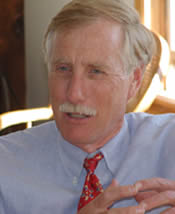Angus King
Jump to navigation
Jump to search

Angus S. King, Jr. (born 31 March 1944) is an American politician and the junior United States Senator from the state of Maine. As an Independent, not affiliated with either the Republican or Democratic parties, he served as the 72nd Governor of Maine from 1995 to 2003. In March 2012 he announced that he would run as an Independent for the Maine seat in the U.S. Senate which was being vacated by Olympia Snowe. King won Maine's 2012 Senate election and took office on January 3, 2013. For committee assignment purposes, he caucuses with the Democratic Party.
Quotes
[edit]


- I think we're going to demonstrate the power of one-to-one computer access that's going to transform education. … The economic future will belong to the technologically adept.
- On his program to purchase iBook computers for Maine public schools, as quoted in "Maine Students Hit the iBooks" by Katie Dean in WIRED (9 January 2002)
- Michael Jordan did not get good at basketball by practicing 42 minutes a week, which is what most kids have in the computer lab. … Whether it's a scalpel, baseball bat or a computer, the skill in the use of a tool rests upon practice and familiarity, and that's what these kids are going to have to an unprecedented extent.
- On his program to purchase iBook computers for Maine public schools, as quoted in "Maine Students Hit the iBooks" by Katie Dean in WIRED (9 January 2002)
- I'm giving it some thought for the very reason that Olympia quit. It's just not working down there and maybe we need to try something different. … We have serious problems in this country but we can't begin to solve them until we solve this shrill deadlock.
- Stating that he was considering a run as an Independent for US Senate after Olympia Snowe's surprise announcement that she would be retiring from it, as quoted in "Olympia Snowe Retirement Causes Maine Scramble" in the Associated Press (29 February 2012)
- We proved that with civility, common sense, building bridges, working with coalitions and working with people one at a time, we could do something. … I can speak for the middle. … The real issue is the system itself.
- If you like the system as it is, I’m not your guy… If you want a shot at changing it, join me.
- Frankly, I think I might scare [the parties], and that would be a good thing.
- I think I can honestly say that if Olympia had announced her retirement because of ill health or to spend more time with Jock I probably wouldn't have run. … What perked me up is why she is leaving. Olympia has 30 years of seniority, she's likable, she works very hard, and if she can't make it work, nobody in either party is going to make it work. … I don't have any illusions it will be easy, but I do think particularly if the two parties are closely divided, I will have an influence … I might have a chance of starting a movement toward change in this broken system. This country has serious problems, but you can't address them if the institution set up to address the problems is broken.
- We could send down a combination of Pericles and Thomas Jefferson, and if that person's reporting to Harry Reid [Senate Majority Leader] or Mitch McConnell [Senate Minority Leader], he's going to be ineffective. … Every vote is a test vote. Every vote is party loyalty. We're sunk if it keeps up this way. … It wouldn't take but four or five centrists like me to completely change the dynamics.
- As quoted in "Angus may be a king-maker" by Deborah McDermott in Seacoast Online (11 March 2012)
- I don't have any illusions that I'm naively going to go down and Harry Reid and Mitch McConnell are going to say, "Angus, tell us how to do this." I mean, I know that's not going to work. But I think, No. 1, my election would send a significant message and, No. 2, it might provoke similar movements in other states. If there were four or five people like me, that would change the whole dynamic.
- I had no intention of getting back into politics. I was teaching at Bowdoin and happily retired from politics.
- On his decision to get back into politics, after the surprise announcement of the widely respected Senator Olympia Snowe that she would not run for office again, as quoted in "Maine’s Incoming Independent Senator Angus King on Caucusing With the Dems" on PBS NewsHour (19 November 2012)
Governor's Travels : How I Left Politics, Learned to Back Up a Bus, and Found America (2011)
[edit]- My approach to the job can be summed up pretty simply — I never viewed politics as my career. Important, yes, worthy of intense commitment, of course — but it was not my whole life. … I saw politics as a way to make a contribution and satisfy my penchant for public policy, but not as something I couldn't live without.
- I always had a kind of Myth of Cincinnatus idea about politics — that public service was something you do for a while in between stints at real life. And when your time is up, you return to the plow, which is hopefully still somewhere close to where you left it.
Bowdoin Academic Spotlight interview (2011)
[edit]
- "Bowdoin Lecturer is King of the Road in 'Governor's Travels'" in Academic Spotlight (2 August 2011)
- One of the real benefits of any travel is gaining some perspective. You see things from different points of view. That came home to me in a variety of ways: politically, economically, seeing what was going on in other states.
- When people asked me in a RV park, "What do you do?" I just said, "I'm a retired state employee from Maine."
- Jefferson said the states are the laboratories of democracy. But the problem is, nobody reads the lab reports.
We've got every state trying to reinvent everything. I was struck even more so after this trip how little exchange there is among states that are coping with exactly the same issues.
- The Southwest was spectacular, but I have no interest in moving there. North Carolina is beautiful in spring and fall. But I can say I didn't find anyplace I'd rather live than Maine.
- You have to take advantage of the opportunities that life gives you, particularly the moments in time when you have time, when you're between jobs or you retire. Get out and go. I think most of us are way too intense. We need to take a deep breath and do things that maybe don't fit the normal picture of what we're supposed to do at that stage of life. In some ways, this book is one big argument for just plain loosening up.
Quotes about King
[edit]- Alphabetized by author
- King is the early favorite as a very popular former governor. He took 59 percent in a three-way reelection race in 1998 (that’s not a typo).
- He would bring to the Senate the independence, the abilities, the reputation, and the disposition that will make him a great senator, that will serve us Mainers well and make us proud every day and that will begin to rebuild and restore the Senate to what it was intended to be.
- On Monday night, Feb. 27, former Maine Gov. Angus King was sitting in his Brunswick home talking with his wife, Mary Herman, about the trips they would take in their new RV.
On Tuesday night, they were discussing whether he should run for the U.S. Senate.
It was just that quickly that his world shifted into high gear, after Maine Sen. Olympia Snowe announced Feb. 28 that she would not run for re-election.
"I really agonized over it. It was a huge personal decision and it completely changes our lives," said the former two-term independent governor. "But I've been handed a truly unique opportunity, and if I didn't take it, I think I would have regretted it."
That unique opportunity, he said, is to shake things up as a centrist independent in Congress, an institution he called broken.- Deborah McDermott, in "Angus may be a king-maker" in Seacoast Online (11 March 2012)

